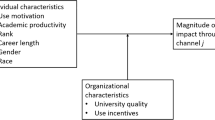Abstract
This study developed a multilevel model of academic publishing and tested the effects of several predictors on faculty publishing. In particular, the analysis paid special attention to faculty preference, time on research, research collaboration, and faculty discipline. The data we used for this study is the Changing Academic Professions (CAP) data which is the follow-up study of the Carnegie Foundation in 1992. The study found that faculty preference for research affects research publishing. In addition, faculty collaboration with international peers is a critical factor in academic publishing. While time spent on research is related to publishing, time spent on teaching does not have a conflicting effect on faculty research. In the institution level analysis, institutional goal-orientation and institutional mission were found to have effects on academic publishing. However, the principal determinants of academic publishing were found to lie at the individual faculty member level. For each of these findings, there are subtle differences by academic discipline.

Similar content being viewed by others
Notes
Medical sciences (84%) have the highest rate of faculty with PhD from a Korean university followed by arts & humanities (60%), engineering (54%), natural sciences (48%), and social sciences (47%).
References
Abramo, G., D’Angolo, C. A., & Costa, F. D. (2008). Assessment of sectoral aggregation distortion in research productivity measurements. Research Evaluation, 17(2), 111–121.
Baird, L. L. (1991). Publication productivity in doctoral research departments: Interdisciplinary and intradisciplinary factors. Research in Higher Education, 32, 303–318.
Becher, T., & Trowler, P. R. (2001). Academic tribes and territories. Buckingham: Society for Research into Higher Education & Open University Press.
Bellas, M. L., & Toutkoushian, R. K. (1999). Faculty time allocation and research productivity: Gender, race, and family effects. Review of Higher Education, 22(4), 367–390.
Bieber, J. P., & Blackburn, R. T. (1993). Faculty research productivity 1972–1988: Development and application of constant units of measure. Research in Higher Education, 34(5), 551–567.
Biglan, A. (1973). The characteristics of subject matter in different academic areas. Journal of Applied Psychology, 57(3), 195–203.
Blackburn, R. T., & Lawrence, J. H. (1986). Aging and the quality of faculty job performance. Review of Educational Research, 23(3), 265–290.
Bonaccorsi, A., & Daraio, C. (2003). Age effects in scientific productivity: The case of the Italian National Research Council (CNR). Scientometrics, 58(1), 49–90.
Bordons, M., Zulueta, M. A., Remero, F., & Barrigon, S. (1999). Measuring interdisciplinary collaboration within a university: The effects of the multidisciplinary research programme. Scientometrics, 46(3), 383–398.
Brew, A. (1999). Research and teaching: Changing relationships in a changing context. Studies in Higher Education, 24, 291–301.
Centra, J. A. (1983). Research productivity and teaching effectiveness. Research in Higher Education, 18(2), 379–389.
Corley, E. A., & Sabharwal, M. (2007). Foreign-born academic scientists and engineers: Producing more and getting less than their U.S.-born peers? Research in Higher Education, 48(8), 909–940.
Dundar, H., & Lewis, D. R. (1998). Determinants of research productivity in higher education. Research in Higher Education, 39(6), 607–631.
Fairweather, J. S. (2002). The mythologies of faculty productivity: Implications for institutional policy and decision making. Journal of Higher Education, 73(1), 26–48.
Friedrich, R. J., & Michalak, S. J., Jr. (1983). Why doesn’t research improve teaching? Some answers from a small liberal arts college. Journal of Higher Education, 54(2), 145–163.
Gander, J. P. (1999). Faculty gender effects on academic research and teaching. Research in Higher Education, 40(2), 171–184.
Hearn, J. C., & Anderson, M. S. (2002). Conflict in academic departments: An analysis of disputes over faculty promotion and tenure. Research in Higher Education, 43(5), 503–529.
Horta, H. (2009). Holding a post-doctoral position before becoming a faculty member: Does it bring benefits for the scholarly enterprise? Higher Education, 58(5), 689–721.
Jarneving, B. (2009). Regional research and foreign collaboration. Scientometrics. doi:10.1007/s11192-009-0064-4.
Katz, J. S., & Martin, B. R. (1997). What is research collaboration? Research Policy, 26(1), 1–18.
Lee, S., & Bozeman, B. (2005). The impact of research collaboration on scientific productivity. Social Studies of Science, 35(5), 673–702.
Marsh, H. W., & Hattie, J. (2002). The relation between research productivity and teaching effectiveness: Complementary, antagonistic, or independent constructs? Journal of Higher Education, 73(5), 603–641.
Muis, K. R., Bendixen, L. D., & Haerle, F. C. (2006). Domain-generality and domain-specificity in personal epistemology research: Philosophical and empirical reflections in the development of a theoretical framework. Educational Psychology Review, 18, 3–54.
Neumann, B. (1996). The teaching-research nexus: Applying a framework to university student’s learning experiences. European Journal of Education, 29, 323–339.
Porter, S. R., & Toutkoushian, R. K. (2006). Institutional research productivity and the connection to average student quality and overall reputation. Economics of Education Review, 25, 605–617.
Porter, S. R., & Umbach, P. D. (2001). Analyzing faculty workload data using multilevel modeling. Research in Higher Education, 42(2), 171–196.
Ramsden, P., & Moses, I. (1992). Association between research and teaching in Australian higher education. Higher Education, 23, 273–295.
Sax, L. J., Hagedorn, L. S., Arredondo, M., & Dicrisi, F. A., I. I. I. (2002). Faculty research productivity: Exploring the role of gender and family-related factors. Research in Higher Education, 43(4), 423–446.
Shin, J. C. (2009a). Building world-class research university: The Brain Korea 21 project. Higher Education, 58(5), 669–688.
Shin, J. C. (2009b). Classifying higher education institutions in Korea: A performance-based approach. Higher Education, 57(2), 247–266.
Shin, J., & Harman, G. (2009). New challenges for higher education: Global and Asia-Pacific perspectives. Asia Pacific Education Review, 10(1), 1–13.
Smeby, J., & Try, S. (2005). Departmental contexts and faculty research activity in Norway. Research in Higher Education, 46(6), 593–619.
Stake, S. (2004). Gender, children and research productivity. Research in Higher Education, 45, 891–920.
Tien, F. F. (2007). Faculty research behavior and career incentives: The case of Taiwan. International Journal of Educational Development, 27, 4–17.
Author information
Authors and Affiliations
Corresponding author
Rights and permissions
About this article
Cite this article
Shin, J.C., Cummings, W.K. Multilevel analysis of academic publishing across disciplines: research preference, collaboration, and time on research. Scientometrics 85, 581–594 (2010). https://doi.org/10.1007/s11192-010-0236-2
Received:
Published:
Issue Date:
DOI: https://doi.org/10.1007/s11192-010-0236-2




